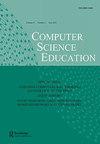Teaching computational thinking to exceptional learners: lessons from two inclusive classrooms
IF 2.2
Q1 EDUCATION & EDUCATIONAL RESEARCH
引用次数: 8
Abstract
ABSTRACT Background and Context Computational Thinking (CT) is a skill all students should learn. This requires using inclusive approaches to teach CT to a wide spectrum of students. However, strategies for teaching CT to students with exceptionalities are not well studied. Objective This study draws on lessons learned in two fourth-grade classrooms – one an inclusive general education classroom including students with and without disabilities, the other an inclusive GATE classroom including students with and without giftedness – to illustrate how CT frameworks can inform inclusive CS instruction. Method A comparative case study design integrating content analysis and first and second cycle coding of data was used to analyze teachers’ instructional strategies using a CT framework. Data included transcriptions of audio-recorded classroom lessons, field notes, and conversations with teachers and students. Findings While each teacher used different strategies, both were effective in developing students’ CT. Explicit instruction provided students receiving special education services with needed structure for the complex tasks inherent to computing. Peer feedback facilitated independent computational practice opportunities for students receiving GATE. Implications This study highlights how inclusive instructional practices can be assessed using a CT framework and leveraged to maximize learning and access to CT curricula for learners with exceptionalities.向特殊学习者教授计算思维:来自两个包容性教室的经验教训
计算思维(CT)是所有学生都应该学习的技能。这就要求采用包容性的方法向广泛的学生教授CT。然而,针对特殊学生的CT教学策略研究还不够深入。本研究借鉴了两个四年级教室的经验教训——一个是包容的通识教育教室,包括有残疾和没有残疾的学生,另一个是包容的GATE教室,包括有和没有天赋的学生——来说明CT框架如何为包容的CS教学提供信息。方法采用内容分析和数据一、二周期编码相结合的对比案例研究设计,运用CT框架对教师教学策略进行分析。数据包括课堂教学的录音、实地笔记以及与老师和学生的对话。虽然每位教师使用不同的策略,但都能有效地培养学生的CT。明确的指导为接受特殊教育服务的学生提供了处理计算机固有的复杂任务所需的结构。同伴反馈为接受GATE的学生提供了独立的计算实践机会。本研究强调了如何使用CT框架评估包容性教学实践,并利用其最大限度地为特殊学习者提供学习和接触CT课程的机会。
本文章由计算机程序翻译,如有差异,请以英文原文为准。
求助全文
约1分钟内获得全文
求助全文
来源期刊

Computer Science Education
EDUCATION & EDUCATIONAL RESEARCH-
CiteScore
6.90
自引率
3.70%
发文量
23
期刊介绍:
Computer Science Education publishes high-quality papers with a specific focus on teaching and learning within the computing discipline. The journal seeks novel contributions that are accessible and of interest to researchers and practitioners alike. We invite work with learners of all ages and across both classroom and out-of-classroom learning contexts.
 求助内容:
求助内容: 应助结果提醒方式:
应助结果提醒方式:


